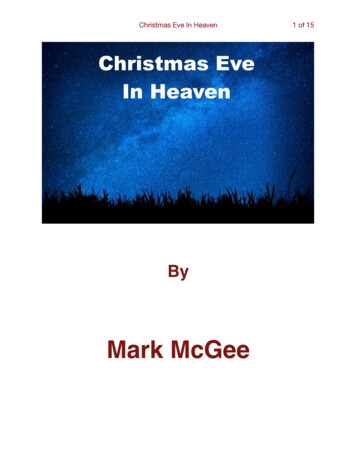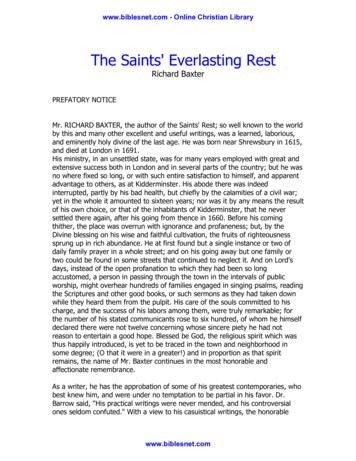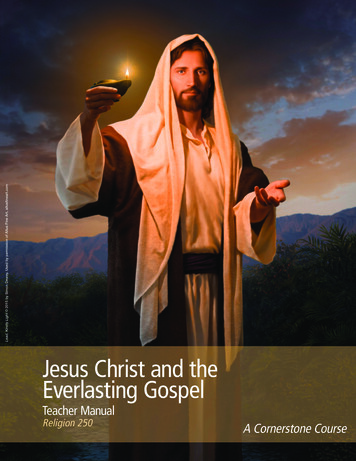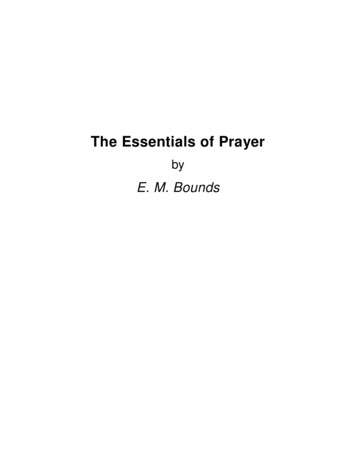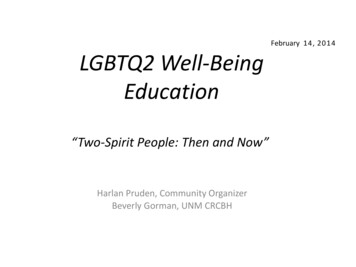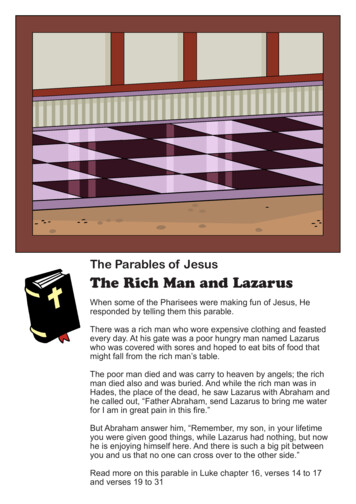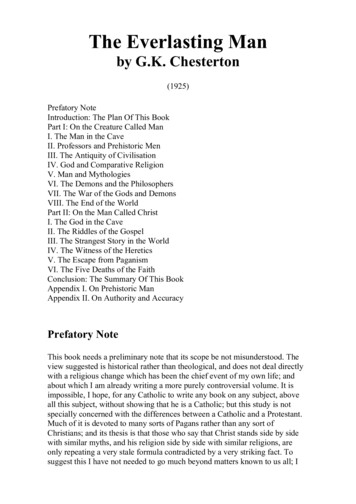
Transcription
The Everlasting Manby G.K. Chesterton(1925)Prefatory NoteIntroduction: The Plan Of This BookPart I: On the Creature Called ManI. The Man in the CaveII. Professors and Prehistoric MenIII. The Antiquity of CivilisationIV. God and Comparative ReligionV. Man and MythologiesVI. The Demons and the PhilosophersVII. The War of the Gods and DemonsVIII. The End of the WorldPart II: On the Man Called ChristI. The God in the CaveII. The Riddles of the GospelIII. The Strangest Story in the WorldIV. The Witness of the HereticsV. The Escape from PaganismVI. The Five Deaths of the FaithConclusion: The Summary Of This BookAppendix I. On Prehistoric ManAppendix II. On Authority and AccuracyPrefatory NoteThis book needs a preliminary note that its scope be not misunderstood. Theview suggested is historical rather than theological, and does not deal directlywith a religious change which has been the chief event of my own life; andabout which I am already writing a more purely controversial volume. It isimpossible, I hope, for any Catholic to write any book on any subject, aboveall this subject, without showing that he is a Catholic; but this study is notspecially concerned with the differences between a Catholic and a Protestant.Much of it is devoted to many sorts of Pagans rather than any sort ofChristians; and its thesis is that those who say that Christ stands side by sidewith similar myths, and his religion side by side with similar religions, areonly repeating a very stale formula contradicted by a very striking fact. Tosuggest this I have not needed to go much beyond matters known to us all; I
make no claim to learning; and have to depend for some things, as has ratherbecome the fashion, on those who are more learned. As I have more than oncediffered from Mr. H. G. Wells in his view of history, it is the more right that Ishould here congratulate him on the courage and constructive imaginationwhich carried through his vast and varied and intensely interesting work; butstill more on having asserted the reasonable right of the amateur to do what hecan with the facts which the specialists provide.IntroductionThe Plan Of This BookThere are two ways of getting home; and one of them is to stay there. Theother is to walk round the whole world till we come back to the same place;and I tried to trace such a journey in a story I once wrote. It is, however, arelief to turn from that topic to another story that I never wrote. Like everybook I never wrote, it is by far the best book I have ever written. It is only tooprobable that I shall never write it, so I will use it symbolically here; for it wasa symbol of the same truth. I conceived it as a romance of those vast valleyswith sloping sides, like those along which the ancient White Horses of Wessexare scrawled along the flanks of the hills. It concerned some boy whose farmor cottage stood on such a slope, and who went on his travels to findsomething, such as the effigy and grave of some giant; and when he was farenough from home he looked back and saw that his own farm and kitchengarden, shining flat on the hill-side like the colours and quarterings of a shield,were but parts of some such gigantic figure, on which he had always lived, butwhich was too large and too close to be seen. That, I think, is a true picture ofthe progress of any really independent intelligence today; and that is the pointof this book.The point of this book, in other words, is that the next best thing to beingreally inside Christendom is to be really outside it. And a particular point of itis that the popular critics of Christianity are not really outside it. They are on adebatable ground, in every sense of the term. They are doubtful in their verydoubts. Their criticism has taken on a curious tone; as of a random andilliterate heckling. Thus they make current and anti-clerical cant as a sort ofsmall-talk. They will complain of parsons dressing like parsons; as if weshould be any more free if all the police who shadowed or collared us wereplain clothes detectives. Or they will complain that a sermon cannot beinterrupted, and call a pulpit a coward's castle; though they do not call aneditor's office a coward's castle. It would be unjust both to journalists andpriests; but it would be much truer of journalist. The clergyman appears inperson and could easily be kicked as he came out of church; the journalist2
conceals even his name so that nobody can kick him. They write wild andpointless articles and letters in the press about why the churches are empty,without even going there to find out if they are empty, or which of them areempty. Their suggestions are more vapid and vacant than the most insipidcurate in a three-act farce, and move us to comfort him after the manner of thecurate in the Bab Ballads; 'Your mind is not so blank as that of Hopley Porter.'So we may truly say to the very feeblest cleric: 'Your mind is not so blank asthat of Indignant Layman or Plain Man or Man in the Street, or any of yourcritics in the newspapers; for they have not the most shadowy notion of whatthey want themselves. Let alone of what you ought to give them.' They willsuddenly turn round and revile the Church for not having prevented the War,which they themselves did not want to prevent; and which nobody had everprofessed to be able to prevent, except some of that very school of progressiveand cosmopolitan sceptics who are the chief enemies of the Church. It was theanti-clerical and agnostic world that was always prophesying the advent ofuniversal peace; it is that world that was, or should have been, abashed andconfounded by the advent of universal war. As for the general view that theChurch was discredited by the War--they might as well say that the Ark wasdiscredited by the Flood. When the world goes wrong, it proves rather that theChurch is right. The Church is justified, not because her children do not sin,but because they do. But that marks their mood about the whole religioustradition they are in a state of reaction against it. It is well with the boy whenhe lives on his father's land; and well with him again when he is far enoughfrom it to look back on it and see it as a whole. But these people have got intoan intermediate state, have fallen into an intervening valley from which theycan see neither the heights beyond them nor the heights behind. They cannotget out of the penumbra of Christian controversy. They cannot be Christiansand they can not leave off being Anti-Christians. Their whole atmosphere isthe atmosphere of a reaction: sulks, perversity, petty criticism. They still livein the shadow of the faith and have lost the light of the faith.Now the best relation to our spiritual home is to be near enough to love it. Butthe next best is to be far enough away not to hate it. It is the contention ofthese pages that while the best judge of Christianity is a Christian, the nextbest judge would be something more like a Confucian. The worst judge of allis the man now most ready with his judgements; the ill-educated Christianturning gradually into the ill-tempered agnostic, entangled in the end of a feudof which he never understood the beginning, blighted with a sort of hereditaryboredom with he knows not what, and already weary of hearing what he hasnever heard. He does not judge Christianity calmly as a Confucian would; hedoes not judge it as he would judge Confucianism. He cannot by an effort offancy set the Catholic Church thousands of miles away in strange skies ofmorning and judge it as impartially as a Chinese pagoda. It is said that thegreat St. Francis Xavier, who very nearly succeeded in setting up the Churchthere as a tower overtopping all pagodas, failed partly because his followers3
were accused by their fellow missionaries of representing the Twelve Apostleswith the garb or attributes of Chinamen. But it would be far better to see themas Chinamen, and judge them fairly as Chinamen, than to see them asfeatureless idols merely made to be battered by iconoclasts; or rather ascockshies to be pelted by empty-handed cockneys. It would be better to see thewhole thing as a remote Asiatic cult; the mitres of its bishops as the toweringhead dresses of mysterious bonzes; its pastoral staffs as the sticks twisted likeserpents carried in some Asiatic procession; to see the prayer book as fantasticas the prayer-wheel and the Cross as crooked as the Swastika. Then at least weshould not lose our temper as some of the sceptical critics seem to lose theirtemper, not to mention their wits. Their anti-clericalism has become anatmosphere, an atmosphere of negation and hostility from which they cannotescape. Compared with that, it would be better to see the whole thing assomething belonging to another continent, or to another planet. It would bemore philosophical to stare indifferently at bonzes than to be perpetually andpointlessly grumbling at bishops. It would be better to walk past a church as ifit were a pagoda than to stand permanently in the porch, impotent either to goinside and help or to go outside and forget. For those in whom a mere reactionhas thus become an obsession, I do seriously recommend the imaginativeeffort of conceiving the Twelve Apostles as Chinamen. In other words, Irecommend these critics to try to do as much justice to Christian saints as ifthey were Pagan sages.But with this we come to the final and vital point I shall try to show in thesepages that when we do make this imaginative effort to see the whole thingfrom the outside, we find that it really looks like what is traditionally saidabout it inside. It is exactly when the boy gets far enough off to see the giantthat he sees that he really is a giant. It is exactly when we do at last see theChristian Church afar under those clear and level eastern skies that we see thatit is really the Church of Christ. To put it shortly, the moment we are reallyimpartial about it, we know why people are partial to it. But this secondproposition requires more serious discussion; and I shall here set myself todiscuss it.As soon as I had clearly in my mind this conception of something solid in thesolitary and unique character of the divine story, it struck me that there wasexactly the same strange and yet solid character in the human story that hadled up to it; because that human story also had a root that was divine. I meanthat just as the Church seems to grow more remarkable when it is fairlycompared with the common religious life of mankind, so mankind itself seemsto grow more remarkable when we compare it with the common life of nature.And I have noticed that most modern history is driven to something likesophistry, first to soften the sharp transition from animals to men, and then tosoften the sharp transition from heathens to Christians. Now the more wereally read in a realistic spirit of those two transitions the sharper we shall find4
them to be. It is because the critics are not detached that they do not see thisdetachment; it is because they are not looking at things in a dry light that theycannot see the difference between black and white. It is because they are in aparticular mood of reaction and revolt that they have a motive for making outthat all the white is dirty grey and the black not so black as it is painted. I donot say there are not human excuses for their revolt; I do not say it is not insome ways sympathetic; what I say is that it is not in any way scientific. Aniconoclast may be indignant; an iconoclast may be justly indignant; but aniconoclast is not impartial. And it is stark hypocrisy to pretend that nine-tenthsof the higher critics and scientific evolutionists and professors of comparativereligion are in the least impartial. Why should they be impartial, what is beingimpartial, when the whole world is at war about whether one thing is adevouring superstition or a divine hope? I do not pretend to be impartial in thesense that the final act of faith fixes a man's mind because it satisfies his mind.But I do profess to be a great deal more impartial than they are; in the sensethat I can tell the story fairly, with some sort of imaginative justice to all sides;and they cannot. I do profess to be impartial in the sense that I should beashamed to talk such nonsense about the Lama of Thibet as they do about thePope of Rome, or to have as little sympathy with Julian the Apostate as theyhave with the Society of Jesus. They are not impartial; they never by anychance hold the historical scales even; and above all they are never impartialupon this point of evolution and transition. They suggest everywhere the greygradations of twilight, because they believe it is the twilight of the gods. Ipropose to maintain that whether or no it is the twilight of gods, it is not thedaylight of men.I maintain that when brought out into the daylight these two things lookaltogether strange and unique; and that it is only in the false twilight of animaginary period of transition that they can be made to look in the least likeanything else. The first of these is the creature called man and the second is theman called Christ. I have therefore divided this book into two parts: the formerbeing a sketch of the main adventure of the human race in so far as it remainedheathen; and the second a summary of the real difference that was made by itbecoming Christian. Both motives necessitate a certain method, a methodwhich is not very easy to manage, and perhaps even less easy to define ordefend.In order to strike, in the only sane or possible sense, the note of impartiality, itis necessary to touch the nerve of novelty. I mean that in one sense we seethings fairly when we see them first. That, I may remark in passing, is whychildren generally have very little difficulty about the dogmas of the Church.But the Church, being a highly practical thing for working and fighting, isnecessarily a thing for men and not merely for children. There must be in it forworking purposes a great deal of tradition, of familiarity, and even of routine.So long as its fundamentals are sincerely felt, this may even be the saner5
condition. But when its fundamentals are doubted, as at present, we must try torecover the candour and wonder of the child; the unspoilt realism andobjectivity of innocence. Or if we cannot do that, we must try at least to shakeoff the cloud of mere custom and see the thing as new, if only by seeing it asunnatural. Things that may well be familiar so long as familiarity breedsaffection had much better become unfamiliar when familiarity breedscontempt. For in connection with things so great as are here considered,whatever our view of them, contempt must be a mistake. Indeed contemptmust be an illusion. We must invoke the most wild and soaring sort ofimagination; the imagination that can see what is there.The only way to suggest the point is by an example of something, indeed ofalmost anything, that has been considered beautiful or wonderful. GeorgeWyndham once told me that he had seen one of the first aeroplanes rise for thefirst time and it was very wonderful but not so wonderful as a horse allowing aman to ride on him. Somebody else has said that a fine man on a fine horse isthe noblest bodily object in the world. Now, so long as people feel this in theright way, all is well. The first and best way of appreciating it is to come ofpeople with a tradition of treating animals properly; of men in the rightrelation to horses. A boy who remembers his father who rode a horse, whorode it well and treated it well, will know that the relation can be satisfactoryand will be satisfied. He will be all the more indignant at the ill-treatment ofhorses because he knows how they ought to be treated; but he will see nothingbut what is normal in a man riding on a horse. He will not listen to the greatmodern philosopher who explains to him that the horse ought to be riding onthe man. He will not pursue the pessimist fancy of Swift and say that menmust be despised as monkeys and horses worshipped as gods. And horse andman together making an image that is to him human and civilised, it will beeasy, as it were, to lift horse and man together into something heroic orsymbolical; like a vision of St. George in the clouds. The fable of the wingedhorse will not be wholly unnatural to him: and he will know why Ariosto setmany a Christian hero in such an airy saddle, and made him the rider of thesky. For the horse has really been lifted up along with the man in the wildestfashion in the very word we use when we speak 'chivalry.' The very name ofthe horse has been given to the highest mood and moment of the man; so thatwe might almost say that the handsomest compliment to a man is to call him ahorse.But if a man has got into a mood in which he is not able to feel this sort ofwonder, then his cure must begin right at the other end. We must now supposethat he has drifted into a dull mood, in which somebody sitting on a horsemeans no more than somebody sitting on a chair. The wonder of whichWyndham spoke, the beauty that made the thing seem an equestrian statue, themeaning of the more chivalric horseman, may have become to him merely aconvention and a bore. Perhaps they have been merely a fashion; perhaps they6
have gone out of fashion; perhaps they have been talked about too much ortalked about in the wrong way; perhaps it was then difficult to care for horseswithout the horrible risk of being horsy. Anyhow, he has got into a conditionwhen he cares no more for a horse than for a towel-horse. His grandfather'scharge at Balaclava seems to him as dull and dusty as the album containingsuch family portraits. Such a person has not really become enlightened aboutthe album; on the contrary, he has only become blind with the dust. But whenhe has reached that degree of blindness, he will not be able to look at a horseor a horseman at all until he has seen the whole thing as a thing entirelyunfamiliar and almost unearthly.Out of some dark forest under some ancient dawn there must come towards us,with lumbering yet dancing motions, one of the very queerest of theprehistoric creatures. We must see for the first time the strangely small headset on a neck not only longer but thicker than itself, as the face of a gargoyle isthrust out upon a gutter-spout, the one disproportionate crest of hair runningalong the ridge of that heavy neck like a beard in the wrong place; the feet,each like a solid club of horn, alone amid the feet of so many cattle; so that thetrue fear is to be found in showing, not the cloven, but the uncloven hoof. Noris it mere verbal fancy to see him thus as a unique monster; for in a sense amonster means what is unique, and he is really unique. But the point is thatwhen we thus see him as the first man saw him, we begin once more to havesome imaginative sense of what it meant when the first man rode him. In sucha dream he may seem ugly, but he does not seem unimpressive; and certainlythat two-legged dwarf who could get on top of him will not seemunimpressive. By a longer and more erratic road we shall come back to thesame marvel of the man and the horse; and the marvel will be, if possible,even more marvellous. We shall have again a glimpse of St. George; the moreglorious because St. George is not riding on the horse, but rather riding on thedragon.In this example, which I have taken merely because it is an example, it will benoted that I do not say that the nightmare seen by the first man of the forest iseither more true or more wonderful than the normal mare of the stable seen bythe civilised person who can appreciate what is normal. Of the two extremes, Ithink on the whole that the traditional grasp of truth is the better. But I say thatthe truth is found at one or other of these two extremes, and is lost in theintermediate condition of mere fatigue and forgetfulness of tradition. In otherwords, I say it is better to see a horse as a monster than to see it only as a slowsubstitute for a motor-car. If we have got into that state of mind about a horseas something stale, it is far better to be frightened of a horse because it is agood deal too fresh.7
Now, as it is with the monster that is called a horse, so it is with the monsterthat is called a man. Of course the best condition of all, in my opinion, isalways to have regarded man as he is regarded in my philosophy. He whoholds the Christian and Catholic view of human nature will feel certain that itis a universal and therefore a sane view, and will be satisfied. But if he has lostthe sane vision, he can only get it back by something very like a mad vision;that is, by seeing man as a strange animal and realising how strange an animalhe is. But just as seeing the horse as a prehistoric prodigy ultimately led backto, and not away from, an admiration for the mastery of man, so the reallydetached consideration of the curious career of man will lead back to, and notaway from, the ancient faith in the dark designs of God. In other words, it isexactly when we do see how queer the quadruped is that we praise the manwho mounts him; and exactly when we do see how queer the biped is that wepraise the Providence that made him. In short, it is the purpose of thisintroduction to maintain this thesis: that it is exactly when we do regard manas an animal that we know he is not an animal. It is precisely when we do tryto picture him as a sort of horse on its hind legs, that we suddenly realise thathe must be something as miraculous as the winged horse that towered up intothe clouds of heaven. All roads lead to Rome, all ways lead round again to thecentral and civilised philosophy, including this road through elf-land andtopsyturvydom. But it may be that it is better never to have left the land of thereasonable tradition, where men ride lightly upon horses and are mightyhunters before the Lord. So also in the specially Christian case we have toreact against the heavy bias of fatigue. It is almost impossible to make thefacts vivid, because the facts are familiar; and for fallen men it is often truethat familiarity is fatigue. I am convinced that if we could tell the supernaturalstory of Christ word for word as of a Chinese hero, call him the Son of Heaveninstead of the Son of God, and trace his rayed nimbus in the gold tread ofChinese embroideries or the gold lacquer of Chinese pottery, instead of in thegold leaf of our own old Catholic paintings, there would be a unanimoustestimony to the spiritual purity of the story. We should hear nothing then ofthe injustice of substitution or the illogicality of atonement, of the superstitiousexaggeration of the burden of sin or the impossible insolence of an invasion ofthe laws of nature. We should admire the chivalry of the Chinese conceptionof a god who fell from the sky to fight the dragons and save the wicked frombeing devoured by their own fault and folly. We should admire the subtlety ofthe Chinese view of life, which perceives that all human imperfection is invery truth a crying imperfection. We should admire the Chinese esoteric andsuperior wisdom, which said there are higher cosmic laws than the laws weknow; we believe every common Indian conjurer who chooses to come to usand talk in the same style. If Christianity were only a new oriental fashion, itwould never be reproached with being an old and oriental faith. I do notpropose in this book to follow the alleged example of St. Francis Xavier withthe opposite imaginative intention, and turn the Twelve Apostles intoMandarins; not so much to make them look like natives as to make them look8
like foreigners. I do not propose to work what I believe would be a completelysuccessful practical joke; that of telling the whole story of the Gospel and thewhole history of the church in a setting of pagodas and pigtails; and notingwith malignant humour how much it was admired as a heathen story, in thevery quarters where it is condemned as a Christian story. But I do propose tostrike wherever possible this note of what is new and strange, and for thatreason the style even on so serious a subject may sometimes be deliberatelygrotesque and fanciful. I do desire to help the reader to see Christendom fromthe outside in the sense of seeing it as a whole, against the background of otherhistoric things; just as I desire him to see humanity as a whole against thebackground of natural things. And I say that in both cases, when seen thus,they stand out from their background like supernatural things. They do notfade into the rest with the colours of impressionism; they stand out from therest with the colours of heraldry; as vivid as a red cross on a white shield or ablack lion on a ground of gold. So stands the Red Clay against the green fieldof nature, or the White Christ against the red clay of his race.But in order to see them clearly we have to see them as a whole. We have tosee how they developed as well as how they began; for the most incrediblepart of the story is that things which began thus should have developed thus.Anyone who chooses to indulge in mere imagination can imagine that otherthings might have happened or other entities evolved. Anyone thinking ofwhat might have happened may conceive a sort of evolutionary equality; butanyone facing what did happen must face an exception and a prodigy. If therewas ever a moment when man was only an animal, we can if we choose makea fancy picture of his career transferred to some other animal. An entertainingfantasia might be made in which elephants built in elephantine architecture,with towers and turrets like tusks and trunks, cities beyond the scale of anycolossus. A pleasant fable might be conceived in which a cow had developed acostume, and put on four boots and two pairs of trousers. We could imagine aSupermonkey more marvellous than any Superman, a quadrumanous creaturecarving and painting with his hands and cooking and carpentering with hisfeet. But if we are considering what did happen, we shall certainly decide thatman has distanced everything else with a distance like that of the astronomicalspaces and a speed like that of the still thunderbolt of the light. And in thesame fashion, while we can if we choose see the Church amid a mob ofMithraic or Manichean superstitions squabbling and killing each other at theend of the Empire, while we can if we choose imagine the Church killed in thestruggle and some other chance cult taking its place, we shall be the moresurprised (and possibly puzzled) if we meet it two thousand years afterwardsrushing through the ages as the winged thunderbolt of thought and everlastingenthusiasm; a thing without rival or resemblance; and still as new as it is old.9
Part IOn the Creature Called ManI. The Man in the CaveFar away in some strange constellation in skies infinitely remote, there is asmall star, which astronomers may some day discover. At least I could neverobserve in the faces or demeanour of most astronomers or men of science anyevidence that they have discovered it; though as a matter of fact they werewalking about on it all the time. It is a star that brings forth out of itself verystrange plants and very strange animals; and none stranger than the men ofscience. That at least is the way in which I should begin a history of the world,if I had to follow the scientific custom of beginning with an account of theastronomical universe. I should try to see even this earth from the outside, notby the hackneyed insistence of its relative position to the sun, but by someimaginative effort to conceive its remote position for the dehumanisedspectator. Only I do not believe in being dehumanised in order to studyhumanity. I do not believe in dwelling upon the distances that are supposed todwarf the world; I think there is even something a trifle vulgar about this ideaof trying to rebuke spirit by size. And as the first idea is not feasible, that ofmaking the earth a strange planet so as to make it significant, I will not stoopto the other trick of making it a small planet in order to make it insignificant. Iwould rather insist that we do not even know that it is a planet at all, in thesense in which we know that it is a place; and a very extraordinary place too.That is the note which I wish to strike from the first, if not in the astronomical,then in some more familiar fashion.One of my first journalistic adventures, or misadventures, concerned acomment on Grant Allen, who had written a book about the Evolution of theIdea of God. I happened to remark that it would be much more interesting ifGod wrote a book about the evolution of the idea of Grant Allen. And Iremember that the editor objected to my remark on the ground that it wasblasphemous; which naturally amused me not a little. For the joke of it was, ofcourse, that it never occurred to him to notice the title of the book itself, whichreally was blasphemous; for it was, when translated into English, 'I will showyou how this nonsensical notion that there is God grew up among men.' Myremark was strictly pious and proper confessing the divine purpose even in itsmost seemingly dark or meaningless manifestations. In that hour I learnedmany things, including the fact that there is something purely acoustic in muchof that agnostic sort of reverence. The editor had not seen the point, because inthe title of the book the long word came at the beginning and the short word at10
the end; whereas in my comments the short word came at the beginning andgave him a sort of shock. I have noticed that if you put a word like God intothe same sentence with a word like dog, these abrupt and angular words affectpeople like pistol-shots. Whether you say that God made the dog or the dogmade God does not seem to matter; that is only one of the sterile disputationsof the too subtle theologians. But so long as you begin with a long word likeevolution the rest will roll harmlessly past; very probably the editor had notread the whole of the title, fo
make no claim to learning; and have to depend for some things, as has rather become the fashion, on those who are more learned. As I have more than once

